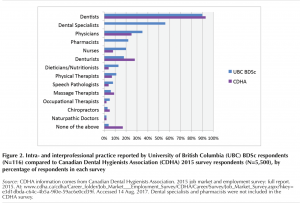In private dental practices, the RDH often spends more time with the client than the dentist, and sees roughly seven-eight clients per day. With recall intervals ranging from three months to one year, depending on health status, the RDH is often the most frequently visited HCP. The value dental hygienists add to a practice can be calculated through the cost of the chair and adding services provided, from maintaining professional standards, and client-centred care which keeps the client coming back.
The variety of factors that contribute to the revenue I produce and value I add in a private practice have increased my appreciation for my professional role. The CDHA’s Job Market and Employment Survey outlines reported highlights such as wage and working conditions, challenges, and what to expect in the future.(1) Findings from the CDHA survey reveal RDHs face barriers, possibly due to the exclusion of an employment contract.
Employment contracts protect RDHs from loss of pay, but also serve as an opportunity to negotiate work-related benefits. As a newly graduated dental hygienist, an employment contract is important to advocate for my professional standards, gain professional development benefits, and have frequent feedback on my performance. Each of these benefits contribute to client safety, professional practice, and maintenance of DH competencies. For myself, my professional goals upon entering private practice are to manage learning, seek mentorship, and practice according to professional standards.
For myself, I think it is important for RDHs to know the value we add to dental practices and maintain current with life-long learning. Employment contracts are a tool RDHs can use as a profession to receive benefits that support our contribution to dental practices.
References:
- CDHA. 2017 job market and employment survey [Internet]. Ottawa, Ontario, Canada: Canadian Dental Hygienists Association. 2017 [Cited 2019 Apr 5]. Available from. https://www.cdha.ca/cdha/Career_folder/Job_Market___Employment_Survey/CDHA/Career/Survey/Job_Market_Survey.aspx?hkey=e3d1dbda-c64c-4b5a-9f0e-59ac6e0cd39f
- Kanji Z, Laronde D. Career outcomes of dental hygiene baccalaureate education: a study of graduates’ professional opportunities, further education, and job satisfaction. J Dent Educ. 2018 Aug;82(8):809-18.
